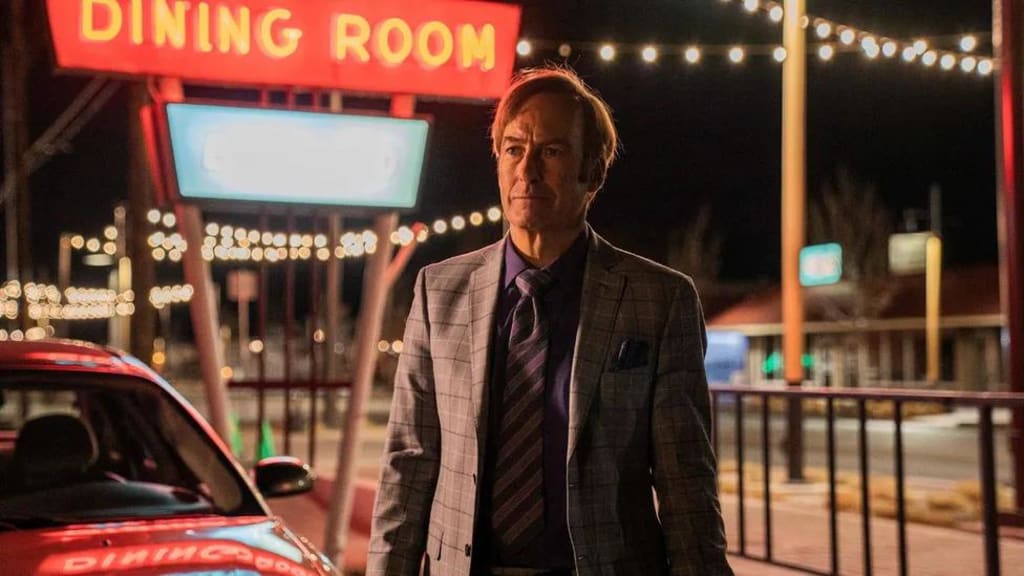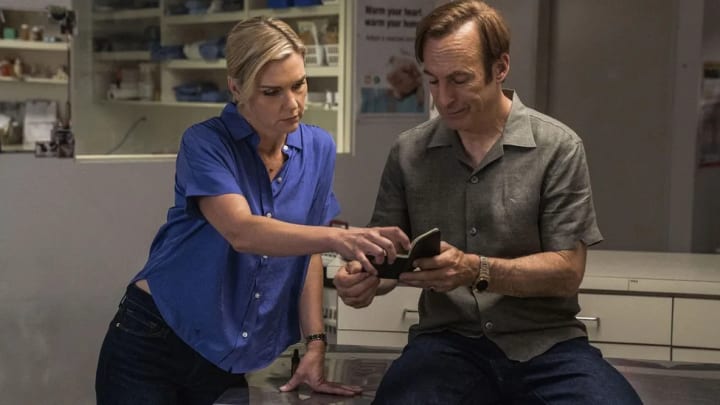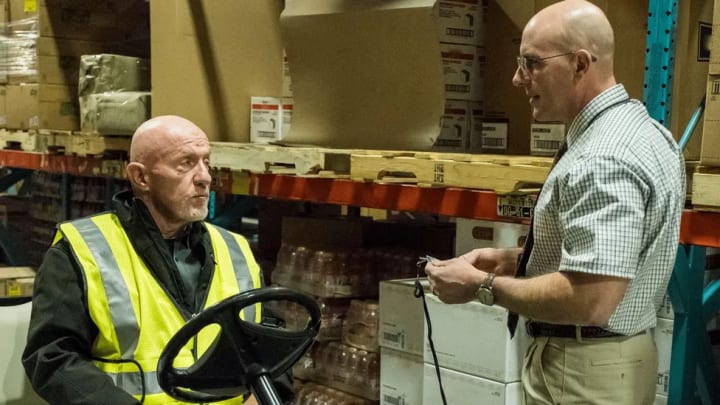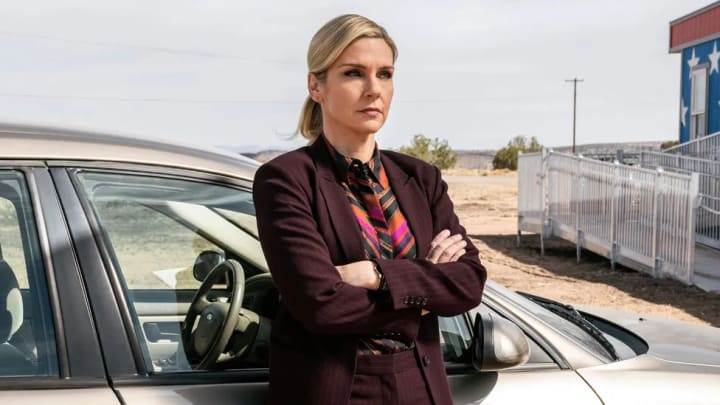How Better Call Saul bettered Breaking Bad
When Breaking Bad creator Vince Gilligan signed up to make a spin-off series, he wasn't sure it would work. So how did it actually improve on its predecessor?

In the height of summer 2013, Vince Gilligan, the creator of "prestige TV" phenomenon Breaking Bad, and fellow screenwriter Peter Gould, took a long walk around their offices in Burbank, California. The end was nigh for Breaking Bad, and they had just recently signed a deal to make Better Call Saul, a spin-off prequel series set around Bob Odenkirk's popular shyster Saul Goodman, a criminal lawyer more criminal than lawyer, more cartoon than man. The only problem? Neither Gilligan or Gould had any idea what the show was about. "We had a very high concept without a lot of follow-through," Gilligan tells BBC Culture. "We would walk around, just cogitate, and say 'okay, so what is this exactly?!'"
Warning: This article contains offensive language
One idea was to make it a 30-minute sitcom. "It would have taken place in Saul's office and you'd basically have a bunch of crazy people come in," explains Gould. But it didn't feel right. Nothing felt right. And after a while they both came to "the very scary conclusion", says Gilligan, that Saul Goodman is not a guy to build a show around. "He's too happy-go-lucky," he adds, "too comfortable in his own skin", anathema to drama. Instead, they had to work backwards from Saul – who, as revealed in Breaking Bad, is really called Jimmy McGill. Who is Saul Goodman? Who did he used to be? Yet the most important question, the one that would unlock the entire show, came from Gould. "He went quiet for a while," recalls Gilligan. "Then he said, 'What problem does becoming Saul Goodman solve?'"

Better Call Saul has taken its time to explore that question. As of the sixth and final season, which was split into two parts and will conclude with a run of six episodes starting today, the answer is still taking shape. Hapless con man Jimmy has adopted the Saul Goodman persona in name, but has not quite yet sold his soul. "When we started this," says Gould, who originally created the character of Saul in 2009 while writing on Breaking Bad season two, "we thought he'd be Saul Goodman with the crazy office by the end of season one. But it was only when we started digging into this character that we realised he had a long journey to go before he was the kind of bastard that would advocate murder as a business expedience
To adequately portray Jimmy's transformation, Gilligan and Gould decided to slow down the hyper-real world of Breaking Bad – with its planes falling out of the sky, its exploding wheelchairs, its meth Nazis – and concentrate instead on constructing a subtler and more considered character study. "Every show has its own internal clock," says Gilligan, "its own metronome" – and Better Call Saul burns at a pace unlike anything else on TV.
"It never seemed slow to us," says Gould, "But looking back, at the end of the pilot of Breaking Bad, Walt has apparently killed two people, and he's gone from being a high school chemistry teacher to someone who cooks meth." To compare, one episode of Better Call Saul features a scene in which Mike Ehrmantraut (Jonathan Banks), the grizzled enforcer of Breaking Bad, spends 10 mesmerising minutes taking apart his car.
"Coming off a hit show like Breaking Bad gave us the confidence to let the characters take their time," says Gould.
"Our philosophy is don't go any faster than you absolutely have to," adds Gilligan. "That way you don't rush past any potential drama, no matter how small it may initially seem."
Two shows in one
It could be argued that Better Call Saul is really two shows: one starring Bob Odenkirk as Jimmy McGill, another starring Jonathan Banks as Mike. The latter's storyline is perhaps what many people would expect of a Breaking Bad prequel: the tale of how ex-cop Mike Ehrmantraut – a man with the grimace of someone forever posing for his passport photo – falls into the orbit of cold, calculating Albuquerque drug lord Gus Fring (Giancarlo Esposito). On the surface, it's the fan-pleasing story – the conduit for most of Better Call Saul's violence and cameos. But it is not as interesting as the other show – an intimate drama of relatively low stakes, of words rather than bullets, but fuelled almost entirely by Jimmy's relationships, and the roles they play in who he is to become.
In Breaking Bad, established comic actor Bob Odenkirk played Saul as some sort of grotesque clown. "Clearly his taste in women is the same as his taste in lawyers," he once remarked, upon meeting Walter White's wife for the first time, "only the very best – with just a right amount of dirty." In Better Call Saul, Odenkirk plays him as a far more complex creation. He is the former con man Slippin' Jimmy (so-called because of his talent for staging slip-and-fall accidents), the charming, charismatic everyman who has vowed to go straight. He looks after his sophisticated older brother Chuck (Michael McKean), a high-powered lawyer with an apparent allergy to electricity, and practices law himself as a small-time hustling attorney after getting his law degree online at the fictional University of American Samoa. In flashback, it's revealed that he studied in the evenings, while during the day he worked in the mailroom of Chuck's firm.
I find Better Call Saul more of a tragedy because I root for Jimmy McGill, I want to see him be a better person – Vince Gilligan
Jimmy becomes a lawyer under the assumption that Chuck would be proud of him, but his brother is appalled. "People don’t change," he snarls. "You’re Slippin' Jimmy. And Slippin' Jimmy I can handle just fine but Slippin' Jimmy with a law degree is like a chimp with a machine gun!" It’s a wounding moment for Jimmy, and one that forms the basis of a profound psychological change – one driven by insecurity and pride; by his natural instincts to cut corners, to play low and dirty; by his realisation that the law is a game to be rigged like any other; by the scammer who told him as a child that "there are wolves and there are sheep"; by him discovering how easy it is for him to eat those sheep with a "song and dance" and a bunch of "fancy words"; by him despising himself for it. In the words of Gould, "he is somebody whose abilities are at war with his morality".
Even now, on the cusp of Better Call Saul's final run of episodes, Jimmy cuts a nuanced and sympathetic figure. But Saul is there, looming in the future, waiting to shave all of that complexity away. As though to remind you, the first half of season six opens with an intriguing scene set after the events of Breaking Bad: the gaudy mansion of Saul Goodman, being emptied by movers after he flees to Nebraska, and assumes the alias of bakery chain manager Gene Takavic. It's all there. The flamboyant ties. The baroque decor. The golden toilet. The cut-out of himself floating in the pool. It is a tacky monument to a corrupted ego, the kind that you may find left behind by some deposed dictator. But it is also seemingly proof that Saul Goodman is not simply performance; that he doesn't go home at night, take off the mask and "slip into a turtleneck" in the words of Gould. But is that true?

"He seems pretty happy with [his situation] in Breaking Bad," says Gilligan. "There's so many bad things that have happened to him. How can he be so happy-go-lucky? Maybe it's a Pagliacci act, maybe he's not quite as happy as he seems."
"Be careful what you pretend to be, you become it," adds Gould, paraphrasing writer Kurt Vonnegut. "You'll learn a little bit more as this season goes on. What we discovered is that there's very specific reasons that he's put on this mask and there's specific reasons that he's playing this role even when he's out of the public view."
It's a fate that feels particularly grim, now that we have come to know the textured man he used to be. He's destined to be emptied, to become a caricature of himself. "Looking back on it", says Gilligan, "we had a lot of people rooting for Walter White throughout the course of Breaking Bad. But oddly enough, I was not one of them. He's really an egotistical prick. So when he became more Scarface than Mr Chips, it seemed inevitable but not tragic. I find Better Call Saul more of a tragedy because I root for Jimmy McGill, I want to see him be a better person."
The show's secret weapon
As the moving company pack away the remnants of Saul Goodman's garish life, one of the movers drops a clue that something of his soul lives on: a spiky bottle stopper for a bottle of expensive tequila. It is ostensibly a memento of Rhea Seehorn's Kim Wexler, once Jimmy's successful lawyer girlfriend, now – as of the most recent episode – his successful scam-artist lawyer wife. But to reduce her to nothing more than Jimmy’s love-interest would be mistake. She has become the show's secret weapon: a character as distinct and layered as Jimmy himself. She is the upstanding lawyer who has fallen in love with a con man; the passionate pursuer of justice who discovers that there is none to be found within the legal system; the woman who will not be "saved" from Saul, but who will mould him herself.
"We did not know Kim was going to be this important to the series," says Gilligan. "But it was the same thing with Jesse Pinkman on Breaking Bad. You hire an actor and you think 'yeah, they’re gonna do a pretty good job' and then you end up falling in love with them.
"We started to realise there's something in her that's a little bit wild," says Gould. "Ironically, I think it has to do with her sense of justice. That's the funny thing about the law. There's a big difference between what's good and what's legal. And when she meets Jimmy and there’s this energy between them, where they switch roles between being the logical one and the wild one. It’s an emotional energy, a sexual energy. It’s addictive."
When we started the show, all people could ask us was 'when are Walt and Jesse going to show up?' and now they keep on asking us, 'what happens to Kim?!'– Peter Gould
"The original feeling we had was that this wonderful person, who's worked very hard to get where she's gotten, meets Saul and he's a corrupting influence," says Gilligan. "But it's more interesting if she has more agency than that. What if they were mutually corruptive instead?" The writers' room were inspired by the 1962 film Days of Wine and Roses, about an alcoholic who turns his wife into a drunk. "I'm not saying it's a perfect analogy for our final season," says Gilligan, "but there's something about scamming, about sticking it to the man, that appeals to Kim. It makes her feel alive. They love each other but they're bad for each other."
We know, of course, what Jimmy will become; it is inevitable. But Kim's absence in Breaking Bad creates an intriguing, and increasingly anxious mystery. Is she in prison? Is she on the run? Are her and Jimmy estranged? Or is it something far worse? It is an ingenious way of using the framework of a prequel to your advantage, of using foreknowledge against the audience. To quote a tweet put out by the official Better Call Saul Twitter account: "I am more worried for Kim Wexler than for most members of my friends and family."
"It really tickles me," says Gould, "that when we started the show, all people could ask us was 'when are Walt and Jesse going to show up?' and now they keep on asking us, 'what happens to Kim?!'"
"I run in to people all the time who say to me, somewhat tremulously, 'if you kill Kim, you are in trouble!'" adds Gilligan, laughing. "To me that's the headline of this show: the character of Kim Wexler. How much people love her, how much people root for her, how disappointing it is that her character is, for lack of a better phrase, breaking bad."

Gilligan's only regret is that Anna Gunn's Skyler White in Breaking Bad – who certain of the show's fans seemed to despise for the crime of not wanting her husband to cook meth – did not get the same reception. "To my dying day, I'll never understand why people did not cotton to Skyler, because Anna Gunn is one of the smartest and most talented people I've ever worked with," he says. "They were on team Walt and were against anyone who was in his way." Gunn, in a column for the New York Times, cited misogyny towards a TV wife that didn’t just 'stand by her man'.
Gilligan stepped back from the writers' room of Better Call Saul after season three, leaving Gould as sole showrunner. He returned for the final season however to write the penultimate script and to direct three episodes, including the season six, part two premiere Point and Shoot. It was during the filming of this episode's opening scene in July 2021 that Bob Odenkirk suffered a heart attack.
"It was just terrible," says Gilligan, who struggles to recall the incident without becoming emotional. "I've learned since that most people survive a heart attack. He had full-on cardiac arrest, which most people do not survive. It was awful. He died right in front of us."
He credits the quick actions of various people, including the on-set emergency medical technician, for saving Odenkirk's life. "They saved his life right in front of me," he says. "I'm standing there like an idiot. I don't know what to do. Just completely useless… We were sure he wasn't going to make it." After being rushed to hospital, Odenkirk made a full recovery (possibly, suggests Gilligan, because he was in such good shape from filming action movie Nobody). "We didn't even know at that point if we were ever going to finish the show or not," he says, "but knowing he was going to survive helped an awful lot. Those were some very dark days."
Odenkirk returned to set a few weeks later, to complete the scene that he had left unfinished. "It’s a very dramatic scene near the beginning of the episode," says Gilligan. "Two thirds of it was shot before he had a cardiac arrest, a third of it after. I defy you to notice the difference."
What's in store?
As for the rest of the season, or indeed how the show ends, Gilligan and Gould are understandably keeping details sparse. There are some things we do know. We know that Bryan Cranston and Aaron Paul will finally be making appearances as Walt and Jesse, which Gould describes as a "thrill". We know that Jimmy will eventually turn into Saul Goodman. We know that after the incident in season six's mid-season finale, in which a major character is inadvertently killed thanks to the actions of Kim and Jimmy, that the couple – and the show itself – have crossed a line they can never uncross.
"There's no question that [what happens at the end of season six, part one] is going to propel us into these last few episodes," says Gould. "I think these remaining stories are maybe the best work we've ever done." The ending – whatever it may be – is not the product of a long-term masterplan but emerged organically during the filming of season five. "As we moved through that season, we started to see where this has to end up," says Gould. "It's been a slow evolution. We take it moment by moment, scene by scene. We try to think ahead as much as we can but if the characters aren't ready to do something we won't do it. That discipline has served us well." He pauses. "My hope and my dream is that the ending we have is surprising, but then once you think about it, feels inevitable."
Both Gilligan and Gould describe coming to the end of Better Call Saul as bittersweet. "I'm very proud of the show. I'm still amazed that it had the legs it did," says Gilligan. "We didn't see it going as long as it did. I'm not even sure I ever thought it'd be as good as it was." How does he feel about the popular idea that it is better than Breaking Bad? "I love it," he says. "I didn't think I would. I thought I would be a little jealous. But it honestly blows me away."
"I always date things by my daughter," says Gould. "She was seven when I started Breaking Bad and is now 22 years old. I don't think I've completely assimilated it." Is there a temptation to return to the Breaking Bad universe, to keep the band going? "It would be very easy to," says Gilligan, who is currently leading the writers' room for his mysterious new show. "It would be very seductive. And I think because it is so attractive, that's the reason I'm resisting. I feel like I have to prove to myself that I'm not a one-trick pony. But check with me in a year or so. I might be saying, 'oh my God, we've got a new spin-off! Oh yeah, it's gonna be great!'"
About the Creator
Mao Jiao Li
When you think, act like a wise man; but when you speak, act like a common man.






Comments
There are no comments for this story
Be the first to respond and start the conversation.